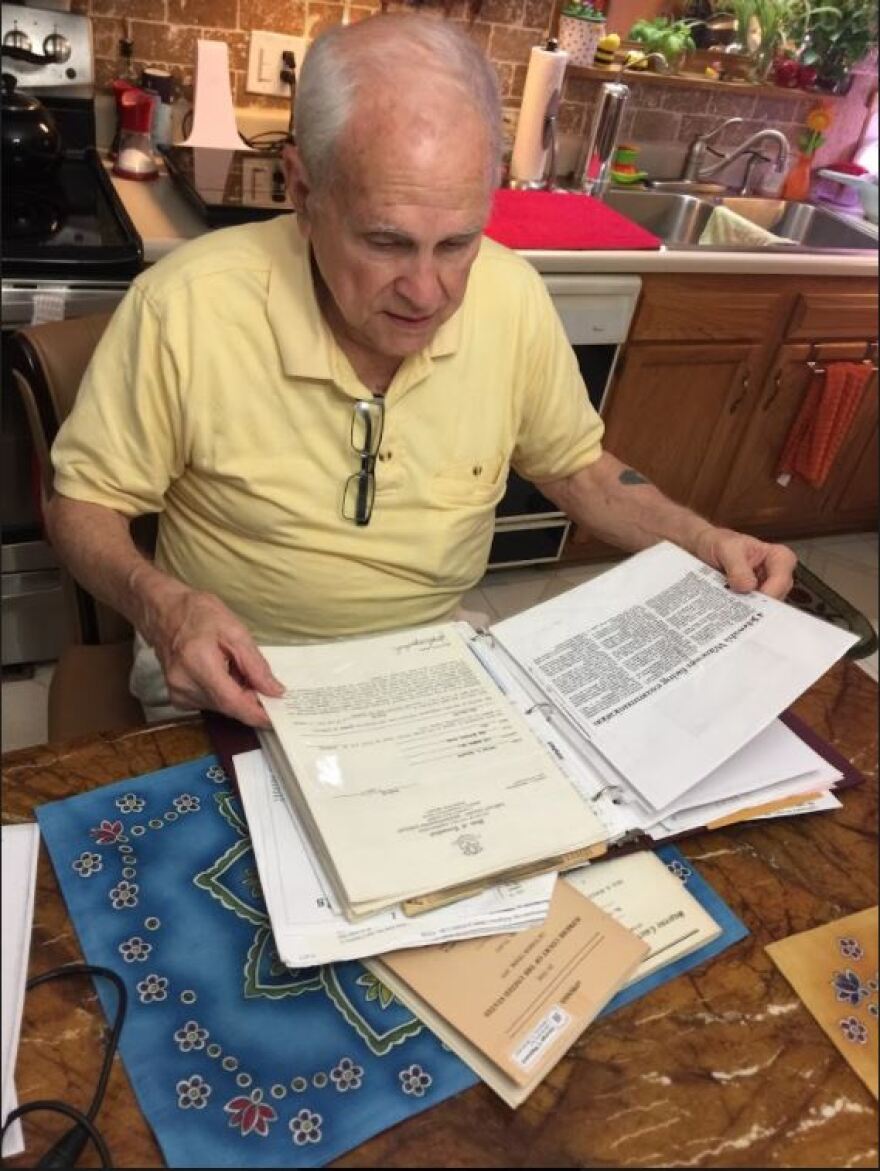George and Maxine Maynard have what you might call a complicated relationship with New Hampshire's state motto.
And when the U.S. Supreme Court takes up a controversial free speech case next month, the Maynards' decades-old legal battle over the state’s ubiquitous “Live Free or Die” will be back in the spotlight.
Opening arguments are set to begin next month between a Colorado baker and the same-sex couple he refused to make a wedding cake for, citing religious beliefs. And the baker’s attorneys are resting much of their argument on the Maynards' 1977 Supreme Court victory.
George and Maxine are in their mid-80s now. They shuffle around their one story home in Connecticut, where they keep tabs on their neighbors and read the Bible every day.
The Maynards are deeply religious. George’s email address, for example, begins with Daniel_2_44, a Bible verse that George refers to as “God’s promise.”
“He’s gonna crush all the governments of the world, and his government is going to rule by his son Jesus Christ,” George explains. “So that’s my email.”
In fact, the Maynards' faith is central to this story and their relationship to "Live Free or Die." George describes himself as a Jehovah’s Witness, even though he was kicked out, or disfellowshipped, in 1966. George said some of the elders didn’t like him, so they falsely accused him of defrauding other members. The details of the story aren't entirely clear, but whatever happened, George hasn’t been allowed in a Kingdom Hall since.
But not for lack of trying.
“When we moved up to New Hampshire, here again I tried to attend meetings, and they wouldn’t let me. They would treat me like a leper,” he said.
It was the early 1970s. George Maynard was deeply religious, disfellowshipped and feeling like he didn’t have the right to practice his own religion. And he was moving to New Hampshire, a state with Live Free or Die on its license plates.
The motto didn’t stand a chance.

To the Maynards, having Live Free or Die stuck on their car was like advertising a way of life they didn’t subscribe to: They didn’t feel free, and they believed God will grant them everlasting life.
George decided to take action: he covered up the motto on his license plate with a strip of red electrical tape
And with that bit of tape, battle lines were drawn between the Maynards and the state of New Hampshire. The first encounter took place in a Lebanon parking lot in 1974. George and Maxine had just been shopping, when an officer walked up to them with a citation for covering up the motto.
“I said, ‘Well, it’s been a long time, I’ve been waiting for you!' ” George recalled.
New Hampshire law prohibited residents from altering their state plates, so George was fined $25. A judge later suspended it, pending good behavior. But George didn’t remove the tape, he went a step further.
Neal Wooley, the Lebanon police chief back then, recalled the same officer pulled George over a second time.
“Only this time, they had taken a pair of cutting shears or something, and physically cut the words right out of the plate," Wooley said.
George ended up with a total of three tickets. The last one came while he was in court, trying to fight the first two tickets. Officer Bryan Robbins saw George was in court that day, so he went out to the parking lot and stripped the plates right off the Maynards' second vehicle.
Meanwhile, George tried to convince the judge that he had a religious objection to having the mottos on his plates. He recorded the 1975 appearance on a cassette tape, and even 40 years later, he can still recall his arguments word for word.
“ 'Live Free or Die' is against my teaching and my belief,” George told the judge. “Because life is more valuable than freedom, to me.”

George told the judge he refused to pay the fines, and so he was sentenced to 15 days in jail.
George lost his job because of the jail time. He was the main breadwinner for their family of four, and the Maynards struggled to get by.
But then, they got a phone call from the ACLU. They wanted to help appeal the Maynards' case to the New Hampshire Supreme Court.
New Hampshire attorney Jack Middleton was on the legal team, which took the case pro bono.
“We thought that he had a meritorious position, he was sincere in his belief and he was going to spend a lot of time in jail if they could keep arresting him,” Middleton said.
And so a legal fight began over what "free" really meant in the state of New Hampshire.
Wooley recalls that the police department “worked with the way the law was written at the time. But the Supreme Court found that the Maynards had the right based on their beliefs. So consequently we lost, and it was like no big deal.”
And that would have been the end of it -- it was a big victory for the Maynards, as they were free to tape up their plates as they pleased. Wooley was clearly fine with the decision, no big deal. Except, the ruling was a big deal in the New Hampshire State House.

“It was very interesting times. The political landscape was quite different than it is now,” said Tom Rath. He was a prosecutor in the Attorney General’s office in the 1970s, and he’s been a fixture in state politics since.
Rath recalled that this case caught the attention to a powerful force in the State House: Governor Meldrim Thomson.
There are endless anecdotes that illustrate Thomson’s unique brand of conservatism: He was very anti-tax, he thought the National Guard should have nuclear weapons, and he was devoted to Live Free or Die.
Thomson died in 2001, but his passion was captured in an old New Hampshire Bar Association educational video about Wooley vs. Maynard.
“This was a sentiment of those who fought in the Revolutionary War. And I think that it’s imperative that we understand that our liberty came to us by those who are willing to make that sacrifice for it,” Thomson said.
In the video, Thomson claimed it was his idea - before he was governor - to put the motto on license plates.
“I don’t know of anymore prominent place to carry a message than right on the license plate. That’s the best billboard of all.”
So, while George Maynard saw Live Free or Die as an affront to his deeply held religious beliefs, Thomson saw the motto as a vital declaration of patriotism. The governor ordered the Attorney General to take the case to the US Supreme Court. And the Maynards were surprised by this.
“I didn’t think they were gonna go that far,” Maxine Maynard said. “But I said, hey.”
As in: "hey -- Bring it on."
On November 29th, 1976, the US Supreme Court heard the case of Wooley vs. Maynard. The AG’s office argued that just because a car displays the motto, doesn’t automatically mean the driver believes in it.
But in the end, the Supreme Court disagreed - and in a 6 to 3 decision, the court ruled it was against the Constitution to force citizens to use private property as a “mobile billboard for the state’s ideological message.”
Much to the surprise of everyone involved, in the decades since that decision, Wooley vs. Maynard has become one of the most important First Amendment cases in U.S. history.
Next month, for example, the Supreme Court will hear the case of a Colorado baker who argues he shouldn’t be forced to bake a wedding cake for a same sex couple, as it’s against his religious beliefs.
One of the baker’s attorneys, Jeremy Tedesco, said the Maynards' victory is crucial to their case.
“It’s one of those just primary cases that if you’re battling as a plaintiff against the government forcing you or compelling you to engage in expression you don’t want to engage in, Wooley vs Maynard is one of your go to cases,” Tedesco said. “So, thank you, New Hampshire.”
While the case of Wooley vs. Maynard may be forever linked to New Hampshire, the Maynards left the state long ago for Connecticut
And yes, they also covered up that state's motto -- “The Constitution State” -- on their license plates.
“A police man tried to give us a ticket,” George said. “And what they did is say ‘Nah, we better not fool around with this guy.' So they dropped it.”







